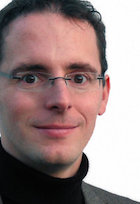Research Focus Interaction
The meaningful use of the flood of data and information, coping with complex processes in challenging specific domains, and the beneficial handling of interconnected digital technologies in nearly all areas of life can only be enabled through intensive research in the field of interactive systems. In a more and more engineered world we are surrounded by a variety of multi-functional, miniaturized, interconnected and integrated devices. The Faculty of Computer Science deals with the following challenging research topics: how to interact with these novel computer technologies, how to design future human-computer interfaces, how to ensure security and data security aspects in ubiquitous contexts, and how to realize the cooperation of distributed and embedded technology.
Besides classical usability aspects, such as effectivity, efficiency and user-friendliness, even the research of user experience gains more and more importance. At the faculty, novel multi-modal interaction paradigms are investigated (e.g. in several sub-projects of the BMBF project ViERforES). The main focus are interactive surfaces (e.g. Tabletops) and modalities such as gestures, multitouch, tangibles, eye tracking and language. Furthermore, research questions concerning the interaction with mobile end devices, smart objects and the interaction of technical devices among each other (e.g. autonomous robots) are dealt with. Besides the research of interaction and technology aspects, this also includes the analysis of security and reliability questions in close interaction of technology, human and environment. Future technical systems should completely match their functionality individually with the respective user and should orientate on his/her skills, preferences, requirements and current needs. The participation in the SFB Transregio 61(Companion Technology) illustrates that research is focused on cognitive technical systems. Besides basic research in the field of Human-Computer Interaction we are analyzing interaction also in conjunction with concrete application domains, amongst others in production and manufacturing (Digital Engineering), web-based learning for medicine, medical image data, collaborative innovation processes, multimedia applications, or even vehicles.
Relation to other key aspects
Interaction is closely related to the research focus image. On the one hand, today’s user interfaces are strongly visually shaped and enable direct interaction with computer-generated image elements. Multimedia user interfaces, medical visualistics applications or interactive information visualization are examples for this. On the other hand, gestural and other interaction modalities are in the first place enabled via automatic analysis of camera images (optical tracking). A fast image processing is also essential for the interaction of technical systems such as, e.g., autonomous robots.
Today’s methods of data analysis and machine learning are used in applications where users are self-interacting. Interfaces for internet research or multimedia information retrieval are examples for an intelligent combination of methods and procedures related to the research fields interaction and knowledge. Another example for the close relation of these research topics is the investigation of interaction in cognitive technical systems within the frame of SFB Transregio 62.
Furthermore, interaction is closely connected to Intelligent Interactive Systems and Digital Engineering.
Priority projects
A range of projects concerning the research focus interaction:
|
Prof. Rösner | Website |
| Prof. Dachselt | Website | |
| Prof. Dachselt | Website | |
| Prof. Nürnberger | ||
| Prof. Preim | ||
| Prof. Dittmann | Website | |
|
|
|
| Prof. Dachselt | Website | |
| Prof. Kaiser | ||
| Prof. Nett |
Research Colloquium
The User Interface colloquium offers a platform for scientific exchange focused on interaction.
Study courses
The research focus interaction forms the scientific background for the Master study course Computational Visualistics and contributes to the Master study course Digital Engineering.

